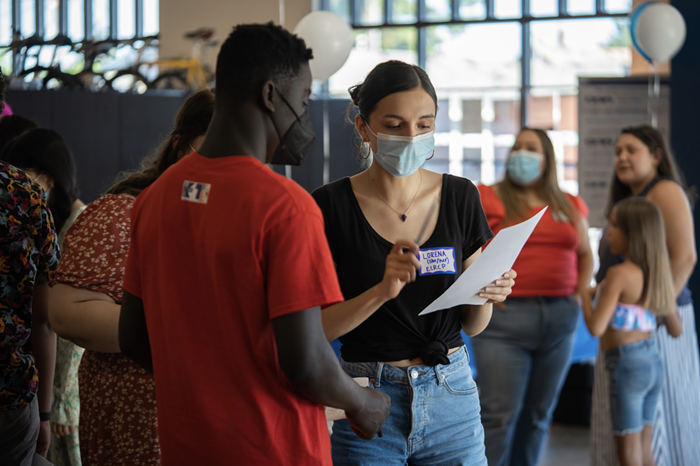If Portland residents were given access to a percentage of the city’s budget to work on projects most important to them, what would they choose? According to participatory budgeting (PB) advocates, the results could be much more reflective of community needs, and the process would get more people, from more walks of life, involved in local politics.
PB proponents are currently gathering signatures for a November ballot initiative that would allow residents to make spending decisions about 2 percent of the city’s annual discretionary budget. Using the city’s current budget as a reference, this would be about $15 million a year.
Similar plans have been adopted in thousands of cities around the world, including New York City, Seattle, Chicago, and Barcelona.
Right now, there are several ways for Portlanders to weigh in on city budget development, including through community listening sessions, public comment periods at budget work sessions, and the city’s bureau budget advisory committees. But ultimately, city decision-makers aren’t beholden to public suggestions about how they should spend residents’ tax money, and polls have shown Portlanders don’t feel good about what city officials are investing in.
The traditional public input process also favors “the usual suspects,” as Jim Labbe—internal operations director at Participatory Budgeting Oregon and one of the chief petitioners behind the ballot initiative—put it. Listen to enough City Council public comment periods and you’ll recognize the frequent testifiers, who often hail from the same demographic groups (white, middle-class or above, central Portland residents). Advocates for participatory budgeting say the process subverts that.
“There are lots of cases that show you get more people—and more diverse people—involved through the participatory budgeting process. And from there, that affects the general budgeting process, because people learn in a way that is much more welcoming and accessible than who can yell the loudest at City Hall or lobby the hardest behind closed doors,” Labbe told the Mercury.
Advocates say PB is about more than changing city spending decisions. Perhaps more importantly, the exercise has been shown to instill civic responsibility and engagement in people who have previously felt left out of decision-making processes.
“It becomes a stepping stone for people to engage more deeply [in local government],” Labbe said. “It becomes an engine for growing participation once people see they can actually exercise power and have an impact on outcomes.”
PB advocates also say the kind of civic accountability and trust a program like this could foster is sorely lacking in Portland right now.
“Trust and faith in our local government is pretty low right now…people aren’t seeing how their tax dollars are being used to make a positive impact in their day-to-day lives,” said Isabela Villareal, policy and communications director at Next Up Oregon, a nonprofit that seeks to involve youth in Oregon politics. “Participatory budgeting fosters a sense of trust, transparency, and accountability, because the process is so clear, guided by residents from beginning to end.”

How would participatory budgeting work?
The PB ballot initiative needs to get enough signatures—40,748, to be exact—by July 5 to earn a place on the November ballot. If it does, and voters say “yes” in November, Portland could have a participatory budgeting system in place by 2027.
A quick and easy rundown of the PB process: Guided by a steering committee made up of residents from each of Portland’s City Council districts, the program would begin with a period of idea collection about how the allocated budget should be spent. A number of these project ideas would go through a project development process with city staff, and then would be placed on a city ballot administered by the PB program. The voting process would be distinct from current city and state elections requirements, meaning the pool of eligible voters would likely be wider by age and immigration status, etc. After ballots are counted, City Council would implement the winning projects.
Finally, advocates emphasize the program’s accountability: It would be subject to evaluation from the steering committee and the city auditor’s office to ensure its effectiveness and transparency for all members of the community.
“We really see the creativity of community members in the PB process,” Villareal said. “The projects implemented really span the gamut, [based on] what communities want and need.”
Villareal cited PB projects around the country that have focused on homelessness, public safety, education, arts, parks and recreation, transportation, and more. A project in Massachusetts created and distributed critical resource kits for homeless residents, hoping to increase access to toiletries, first-aid items, feminine hygiene products, and more necessities. In Vallejo, California, residents voted to implement a Youth Firefighter Academy, dedicated to mentoring teens and providing them with a fundamental education for becoming a first responder.
“I just don't see those kinds of opportunities happening for the young people in Portland without a process like this,” Villareal said.
The value of participatory budgeting in Portland
While the idea of bringing PB to Portland has proven to be popular with a wide range of people, there have been some naysayers.
Earlier this month, District 4 City Council candidate Bob Weinstein released a statement opposing “mandatory budget set-asides,” calling participatory budgeting a “slippery slope.” He said he worried the initiative would be unaccountable and could undermine critical city priorities.
“What’s next? If this succeeds, other advocacy groups will want mandatory budget set-asides in the Charter that will further limit the City’s ability to address priorities and problems that arise,” Weinstein wrote.
Labbe disputed that characterization. He said under Portland’s PB initiative, City Council would still have power to prescribe some parameters for each budget cycle.
“They could set broad goals for each cycle, and say, ‘This year, we really want to focus on solutions for the housing crisis, or public safety, or climate justice,’” Labbe said. “[Participatory budgeting] is not about prescribing outcomes. It's about redistributing power.”
The city’s budget director said in recent community listening sessions that roughly 90 percent of the city’s annual budget is earmarked for specific purposes and can’t be redirected.
PB advocates also point out its operation in Portland has been a long time in the making. The process of bringing participatory budgeting to Portland has been stop-and-go for about 15 years. Former Mayor Sam Adams apparently expressed an interest in the idea during his administration, and Mayor Ted Wheeler announced his support for bringing “New York-style participatory budgeting” to the city during his campaign in 2016.
But momentum for the budgeting practice in Portland has taken off in the last few years, with more and more advocates speaking out in favor of the process. And they say now—with the new, more representative city government coming into place next year—is the perfect time to get it going.
“The November 2024 election presents a unique opportunity for this change,” the initiative’s website states. “Frustration with the current city council, an expected higher turnout of diverse demographics, a full ballot with charter amendments, and a new, more representative City Council all create a favorable environment for implementing voter-approved, charter-mandated participatory budgeting.”
Danny Cage, another co-chief petitioner and the youth liaison at Participatory Budgeting Oregon, said the current community engagement process is not working.
“We spend thousands of dollars on community engagement, and at the end, people feel disengaged and disillusioned…We don’t really have a true vessel to actually capture people’s wants and needs within the budget,” Cage said. “It’s really about everyone who lives in this great, amazing city, getting to interact with the budget, regardless of their socio-economic or political power. That’s really at the heart of participatory budgeting.”
Campaign organizers are currently recruiting interested residents to help gather signatures and get the initiative on November's ballot. Learn more about the process here.




















